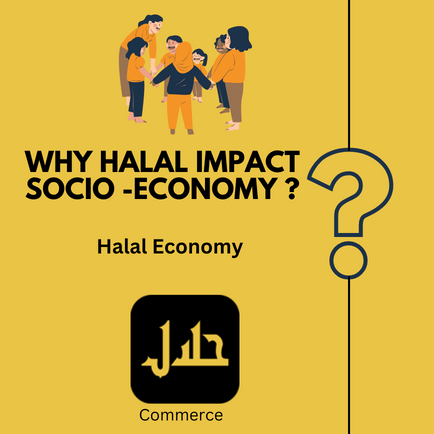-
 CategoryAll
CategoryAll
Full list all active categories -
 Apparel
Apparel
Top modest clothes, designer collection. -
 Cosmetic & Beautypopular
Cosmetic & Beautypopular
Halal cosmetic & beauty everything you need to take care of your skin. -
 Fragrance & ScentsDiscover Halal scents
Fragrance & ScentsDiscover Halal scents
Shop premium attar, fragrance, oil and home scents -
 Gift & SouvenirNew
Gift & SouvenirNew
Best gift for your loved ones, holiday, and special occasion
Why Halal Impact Socio-Economy?

Bismillah, In the name of Allah, most merciful, most gracious.
In a globalized world where cultures and economies intersect, the concept of Halal extends far beyond religious significance. Halal, which means "permissible" in Arabic, primarily relates to Islamic dietary laws, but its impact resonates in various aspects of socio-economy. This article delves into the profound influence of Halal practices on the socio-economic landscape.
Introduction: The Halal Ecosystem
The Halal ecosystem is a multifaceted network comprising food, finance, and lifestyle sectors, all interconnected through shared values and practices. Understanding its socio-economic impact necessitates exploring each facet.
Halal Economy - A Growing Power
The Halal economy has emerged as a substantial economic force. It encompasses food, pharmaceuticals, cosmetics, and more, generating a market worth billions of dollars annually. This sector's growth brings forth several socio-economic consequences.
1. Market Expansion
The Halal market's expansion leads to increased trade and investments between countries, fostering economic growth and job opportunities.
2. Export Opportunities
Halal certification facilitates international trade, unlocking new markets for businesses and boosting export revenue.
Financial Instruments and Halal Finance
Halal finance is built on the principles of Sharia, ensuring ethical and responsible financial practices. It provides various financial instruments and services catering to the needs of both Muslims and non-Muslims.
3. Islamic Banking
Islamic banking promotes fairness and transparency in financial dealings. It encourages investment in ethical and sustainable projects, contributing positively to the economy.
4. Ethical Investments
Halal finance promotes ethical investments, steering capital towards socially responsible ventures that benefit society and the economy.
Halal Lifestyle - Beyond Food
The influence of Halal extends to lifestyle choices, impacting socio-economic aspects in unexpected ways.
Halal Tourism
Halal tourism has witnessed a surge in popularity, attracting travelers seeking destinations that adhere to Islamic values. This trend creates revenue streams in the tourism sector.
5. Hospitality Industry
Halal-friendly accommodations and services stimulate tourism, boosting the hospitality industry in Halal-conscious regions.
Halal Cosmetics and Fashion
Halal-certified cosmetics and fashion products cater to a global audience, increasing market competitiveness and contributing to economic growth.
6. Export Potential
The export of Halal cosmetics and fashion products generates foreign exchange revenue, enhancing a nation's economic resilience.
Socio-Economic Benefits
The socio-economic benefits resulting from the Halal ecosystem are significant and far-reaching.
7. Job Creation
Halal industries create employment opportunities, reducing unemployment rates and improving living standards.
8. Ethical Consumption
Halal encourages ethical consumption, which supports fair labor practices and sustainable production, benefiting workers and industries.
9. Cross-Cultural Understanding
The global acceptance of Halal practices fosters cross-cultural understanding and cooperation, promoting peace and stability.
Conclusion
The impact of Halal on the socio-economy cannot be underestimated. From driving market expansion to promoting ethical investments and job creation, Halal practices are a force for positive change. Embracing Halal principles can lead to economic growth, job opportunities, and a more inclusive society.
FAQs
- What is the Halal economy?
- The Halal economy encompasses various sectors like food, cosmetics, and finance, adhering to Islamic principles and practices, contributing to economic growth.
- How does Halal finance differ from conventional finance?
- Halal finance follows Sharia principles, promoting ethical and responsible financial practices and investments.
- What is the significance of Halal tourism?
- Halal tourism caters to travelers seeking destinations adhering to Islamic values, boosting tourism revenue and the hospitality industry.
- How does Halal impact job creation?
- Halal industries create job opportunities, reducing unemployment rates and improving living standards in communities.
- Why is ethical consumption encouraged in the Halal ecosystem?
- Ethical consumption in Halal practices supports fair labor practices and sustainable production, benefiting workers and industries.
Incorporating Halal principles into various aspects of life not only respects religious beliefs but also contributes significantly to socio-economic development, making it a powerful force for positive change in our interconnected world.
We welcome any feedback, suggestion, recommendation of articles posted here. Share the article to those may benefit. We support ecofriendly sustainable product and Islamic initives retail businesses. If we can help your business, do get in touch with us here
Regards,
Halal Commerce
No posts found
Write a review© 2020 - 2025 Halal Commerce | Halal Commerce Canada Inc.. Islamic Lifestyle Marketplace


.png?1663429077865)
.png?1663429442922)
